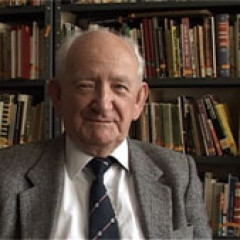I can’t think of a
novel in which a philatelist appears as a positive character, and certainly not
a brave one. If you can think of any, please let me know by sending me an email at patemantrevor@gmail.com
*

When I started stamp
dealing in the 1990s, one of the first dealers I met was Zbigniew Bokiewicz who
had a shop in London’s Strand, directly opposite Stanley Gibbons in what was
called The Strand Stamp Centre. He was born in Warsaw in 1923, so he was around
seventy when I met him, very white haired.
He was happy to talk but was always very modest and quiet in his manner.
Later, after he stopped trading in the Strand, I visited him at his home in
Chiswick, met his wife, and bought material from his stock which he was now
selling off. Later still, he used to come to what was called the Strand Stamp
Fair, which was held monthly but no longer in the Strand - by then it had moved
to a hotel just off Russell Square. He continued to sell me small quantities of
material which he brought to the stamp fair in a small, battered briefcase. By
this time, he had bought an apartment in Warsaw; eventually he
moved back to the city where he was born. On one of the last occasions when I
met him he showed me a photograph, recently taken, in which he was receiving an
award from the Polish president. He died in 2016.
In 1939, Mr Bokiewicz
(as he was always called) was a sixteen year old schoolboy and boy scout. His academically
prestigious school was shut down early in the period of German occupation
(Poles were to be limited to primary and technical schooling) and Bokiewicz
turned to black market dealing and then, with friends, opened a stamp shop in
Warsaw.
At the same time as he
ran the stamp shop, he was a member of the Polish Home Army, received military
training, used the stamp shop as a contact point, and by the time of the Warsaw
Uprising had officer status which meant that when captured, he was sent to an
officer prisoner of war camp, Oflag VIIA - Murnau. By the time the camp was
liberated by American forces, Bokiewciz’s weight had dropped to 42 kilos. But
he went on to join the army of General Anders and was sent to fight in Italy. At the end of the war, he was able to make his home in England. His
knowledge of languages (Polish, German, Italian, French) helped him get a job
with Thomas Cook, the travel agents, but in due course he established
Continental Stamp Supplies Ltd.
If you Google “Zbigniew
Bokiewicz” you will find many records of interviews that he gave late in life
in both Polish and English. There are video recordings, a sound recording for
the Imperial War Museum but very late in his life (2014) and less informative
than the interviews transcribed into various books, for example this one which appears unabridged on
Google:
*
Every year in Italy
since 1989, a marathon takes place in honour of Giulio Bolaffi (1902- 1987).
But it is not because he was an internationally famous philatelist. The
marathon follows a path in the Valle de Susa, east of Torino and close to the French border. The path was once used
by Italian partisans in the Second World War who belonged to division IV GL, the
Stellina, commanded by Bolaffi. Stellina
eventually grew to number six hundred partisans (partigiani) and Bolaffi led
them until June 1945, when he returned to civilian life. The website of today’s
Bolaffi company shows Giulio in partisan
uniform:
Bolaffi was Jewish. Confronted
by Italian racial laws which progressively limited the activities of Jewish
businesses, Giulio’s brothers Dante and Roberto emigrated. Giulio stayed and
left his family behind to join the resistance. His wife died in 1943 during his
absence but his children Stella (hence Stellina)
and Alberto (named after Giulio’s father) survived the war.
There is a summary of Giulio
Bolaffi’s career on Wikipedia. Notably, Bolaffi kept nine war diaries and these
have been published in a 500 page book:
(Acknowledgement: For research assistance with Bolaffi's career, I am
grateful to Giada Santana)

No comments:
Post a Comment